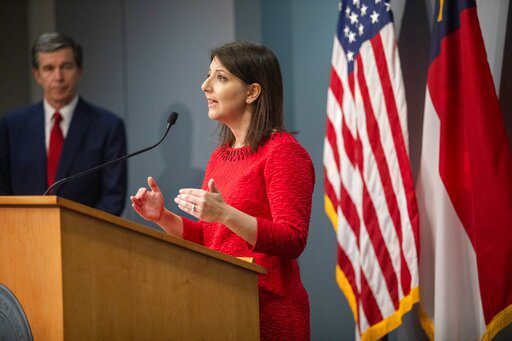
RALEIGH — The N.C. Department of Health and Human Services (NCDHHS) has issued a letter to county officials and leaders asking them to consider creating ordinances to “help slow the spread of the virus” and enforce various COVID-19 restrictions.
The NCDHHS letter places the onus on cities and counties to increase COVID-19 restrictions with accompanying civil penalties beyond what is currently in place at the local level to increase compliance with Gov. Roy Cooper’s executive orders.
“The incredible work of our local partners has allowed North Carolina to avoid the first and second waves of rapid spikes in COVID-19 positives that devastated so many other states. To protect our communities, we must continue working together in this fight against COVID-19,” wrote NCDHHS secretary Mandy Cohen and NCDPS Secretary Erik Hooks.
“As discussed on the calls, our first and best approach to continuing to slow the spread of COVID-19 is to win the hearts and minds of North Carolinians,” write Cohen and Hooks.
The letter, which was sent to 36 counties, asks local officials to consider actions that would “include restrictions imposing a higher State of Emergency standard than those included in the Governor’s most recent Executive Order.” The letter also asks counties to “adopt an ordinance that imposes a civil penalty or fine.”
Areas the letter suggests placing such fines on businesses that do not enforce the mask requirements and establishing lower mass gathering limits. Other suggestions included curtailing the sale of alcohol earlier than the current statewide 11 p.m. curfew, limiting restaurant service and closing “high risk venues such as bars and night spots.”
In a press release, NCDHHS described these suggestions as asking counties to “help slow the spread of the virus by promoting the 3 Ws and considering local actions to improve compliance with executive orders.”
According to NCDHHS, the letter was sent to counties that had 300 or more new cases in the last 14 days and has been “identified by the White House Task Force as a county of concern.” NCDHHS says that means counties, where the rate of cases is more than 50 cases per 10,000 people or is one of the “three most populous” counties in the state.
The following counties received the NCDHHS letter: Alamance, Avery, Burke, Caldwell, Caswell, Catawba, Chowan, Cleveland, Craven, Cumberland, Davidson, Duplin, Edgecombe, Gaston, Graham, Greene, Guilford, Hoke, Hyde, Johnston, Lincoln, Mecklenburg, Moore, Nash, New Hanover, Onslow, Pitt, Randolph, Robeson, Rockingham, Rowan, Scotland, Union, Wake, Watauga and Wayne.
Under Phase 3, most bars and nightclubs are still closed as the order only allows bars to open up 30% of their patio space if they have one. One club owner recently told North State Journal that “Phase 3 is just as much of a death sentence to bars as Phase 2 was.”
North Carolina Bar and Tavern Association (NCBATA) President Zack Medford called Phase 3 “a slap in the face” and says the 30% outdoor-only reopening was “pointless.”
Lt. Gov. Dan Forest, Cooper’s November opponent for governor, commented on the letter, saying, “Gov. Cooper is attempting to use local governments to punish business and individuals doing what they can to survive. He has repeatedly said he has full authority over his COVID shutdown, which means he also gets 100% of the responsibility. Passing the buck to local businesses and municipalities is the antithesis of leadership.”




